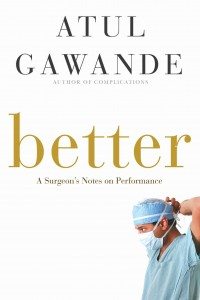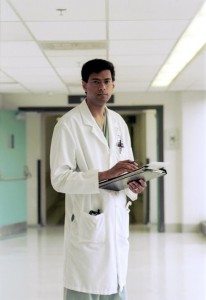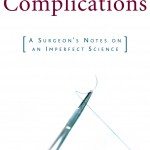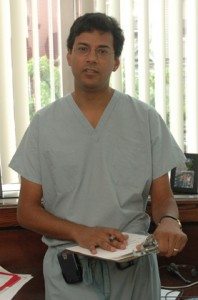Dr. Atul Gawande turns on the microscope on the medical profession….
For most of us, doing just one thing imperfectly well in life is a major challenge. And then you have Dr. Atul Gawande who does many things – and does them all perfectly well. Surgeon, writer and professor – he has searched for excellence in all these roles and often achieved it.
To look at his resume is to wonder if it’s the resume of just one man – or several!
Just listen to this: Gawande is a staff member of Brigham and Women’s Hospital, the Dana Farber Cancer Institute – and the New Yorker magazine! He is also Assistant Professor of Surgery at Harvard Medical School, Assistant Professor in the Department of Health Policy and Management at the Harvard School of Public Health, and Associate Director for the BWH Center for Surgery and Public Health. He has published research studies in areas ranging from surgical technique to US military care for the wounded, to error and performance in medicine. He is the director of the World Health Organization’s Global Challenge for Safer Surgical Care.
When he was in his 30’s, he became a senior health policy advisor in the Clinton presidential campaign and White House from 1992 to 1993. In 1998 he became a staff writer for the prestigious New Yorker magazine and in 2003 he completed his surgical residency at Brigham and Women’s Hospital, Boston, and joined the faculty as a general and endocrine surgeon. And on top of all that he is also a dad! He and his wife Kathleen Hobson are the parents of three – Walker, Hattie, and Hunter. All this achieved by the age of 40!
Gawande, who grew up in Ohio, is himself the son of two physicians: his father is an urologist and his mother a pediatrician. He received his B.A.S. from Stanford University, and M.A.in politics, philosophy, and economics from Oxford University, He then went on to get his M.D. from Harvard Medical School, and M.P.H. from the Harvard School of Public Health.
No surprise then that in 2006 he received the MacArthur ‘Genius’ Award for his research and writing. In fact he’s written not only for the New Yorker but other topnotch publications like Slate and the New York Times. His writings have appeared in the annual Best American Essays and in Best American Science collections.
Atul Gawande is one physician who has always delved deep into his profession to examine it with an unbiased eye – warts and all. His first book, written while he was a resident, ‘Complications: A Surgeon’s Notes on an imperfect Science’ turned the spotlight on a resident’s life and became a finalist for the National Book Award in 2002 and was published in more than a hundred countries.
“It was written from the perspective of someone who was just starting out in medicine,” he recalls. “I was trying to understand in that set of stories how and why medicine is imperfect and if medicine is imperfect, how do we become remotely competent?”
And now as his journey into the medical world has continued, he’s written ‘Better: A Surgeon’s Notes on Performance.’ A throng had gathered in a book store in Manhattan to hear him read – his fan base is huge for the concerns he raises are on everyone’s minds.
“Over the last few years I’ve been trying to answer a slightly different set of questions,” the tall, lanky Gawande says. “I feel I may be competent at what I do but there’s a slightly harder question: what’s the difference between those who are merely competent and those who are good? What makes medicine particularly interesting is that failure is so easy – it’s right around the corner.”
Indeed, he has not only written about the possibilities of errors and human failures in medicine, but has also worked to bring about real-life changes. . Through initiatives at the Center for Surgery and Public Health at Brigham and Women’s Hospital, Gawande is working to improve medical practice.
 Among his innovations are bar codes to prevent surgeons from accidentally leaving sponges and instruments in patients He says: “For the last eight years, my research agenda has focused on making advances in two areas: understanding and ultimately reducing injuries from error in surgery; and improving policies affecting the provision of surgical and medical care. More recently my work has expanded to address questions in global health–in particular, how to meet the growing demand for care for surgical diseases in poorer countries.”
Among his innovations are bar codes to prevent surgeons from accidentally leaving sponges and instruments in patients He says: “For the last eight years, my research agenda has focused on making advances in two areas: understanding and ultimately reducing injuries from error in surgery; and improving policies affecting the provision of surgical and medical care. More recently my work has expanded to address questions in global health–in particular, how to meet the growing demand for care for surgical diseases in poorer countries.”
‘Better’ is all about going that extra mile, of crossing the chasm from average to being the best possible, and indeed the book is not just for physicians but for anyone who struggles to do better, to search for excellence.
He says about researching that book, “The first thing I found was that it wasn’t how smart people at the top of their game were – they weren’t geniuses or smarter than anyone else – instead what they tended to have is a capacity to look for fallibility in themselves, in others and in the system around them and then to try to find ways to overcome that fallibility.
“One of the things we find difficult to acknowledge is that in medicine there is a bell curve –that there is a spread between the bottom and the top in our profession – that most of us were not in fact at the top but right there in the mediocre middle.”
‘Better’ is full of fascinating stories – from emergency rooms in America to rural village hospitals in India to the killing fields of Iraq where military surgeons are fighting tremendous odds to save soldiers who have burns over almost hundred percent of their bodies or three limbs blown away.
“We have no idea whether it is possible to live a good life with no arms and only one leg. But we don’t want the doctors to give up. Instead, we want them to consider it their task to learn how to rehabilitate survivors despite the unprecedented severity of their injuries. We want doctors to push and find a way.”
He tells of how a doctor’s persistence can have wonderful results even in mundane situations: his own 10-year-old daughter Hattie suffered from psoriasis and the doctor had continuously given her steroid creams and medications, to no avail. She would just have to live with the situation, until she outgrew it. Yet along came another doctor who took the challenge and tried something new: he put her on an ordinary antibiotic which did not work on adults but sometimes did on children – in two weeks, her scaly patches were gone.
“The seemingly easiest and most sensible rule for a doctor to follow is: Always Fight,” he says. “Always look for what more you could do. I am sympathetic to this rule. It gives us our best chance of avoiding the worst error of all – giving up on someone we could have helped.”
In ‘Better’ he tries to analyze what makes a doctor fight the odds and get better results. Why is it that at an average hospital center you have a 33 year life expectancy while some of the best centers give you a chance of a 47 year life expectancy? Can one take the know-how that exists at the top of the bell curve and take it elsewhere?
In the old days it was different but in today’s medical world there are just so many possibilities to beat the odds. “We are in a situation where we have 6600 different drugs available to us, we have hundreds of ways we could go about making a diagnosis and thousands of possible treatments,” he says. “What you come to then is a realization that for all our technology and science and know-how, it’s all become more human because the decisions we make when it’s one doctor and one patient sitting down, the smallest choices can make a world of difference. There’s the possibility to do better for people and as a result there is a possibility to do worse.”
Indeed, for anyone in any job, the self-doubt is there. To the large crowd listening to him spellbound, Gawande said rhetorically, “What if I turn out to be average? If I was one of the worst, the answer would be easy – I’d turn in my scalpel. But what if I am a B, working as I do in a city which is mobbed with surgeons? How could I justify putting patients under the knife?
“I could tell myself – someone’s got to be average. If the bell curve is a fact then so is the reality that most doctors are going to be average – there’s no shame in being one of them, right?
Except of course there is.
What’s troubling is not being average but settling for it. Everyone knows that average-ness for the most part is our fate. And in certain matters – looks, money, and tennis – we would do well to accept this. But in your surgeon, your child’s pediatrician, your police department, your local high school – when the stakes are our lives and the lives of our children – we want no one to settle for average.”
So what can a physician do? As Gawande points out, few get grand chances to plan a polio vaccination for 4.2 million children in southern India or create innovative ways to save soldiers in Iraq. So what’s the role of a doctor in the larger scheme of things, what difference can one individual make?
“No doctor wants to believe the he or she is a bit player, though. After all, doctors are given the power to prescribe more than 6600 potentially dangerous drugs. We are permitted to open human beings up like melons. Soon we will even be allowed to manipulate their DNA.”
Yet the reality is that each doctor is just a cog in machine. In his book, Gawande suggests ways in which physicians can make a difference, and be a ‘positive deviant.’ One suggestion is ‘write something.’ “For all its complexity, medicine is more physically than intellectually taxing. Because medicine is a retail enterprise, because doctors provide their services to one person after another, it can be a grind. You can lose your larger sense of purpose. But writing lets you step back and think through a problem. Even the angriest rant forces the writer to achieve a degree of thoughtfulness.”
‘Change’ is another one of his mantras for he feels physicians should not take the safer, easier course but try to seek out solutions: “As successful as medicine is, it remains replete with uncertainties and failure. This is what makes it human, at times painful, and also so worthwhile.”
To the large and anxious crowd at his reading, who wanted to know what they could do as patients, he smiled and empowered them too: “You get into the plane, is there anything you can do about the people in the cockpit? Turns out you can!”
He urged them to ask questions, overcome medication errors by bringing along their medicines for clarification, and always know what they were signing for. His parting words, “Never leave a sick person alone. Hospitals don’t make it easy – there’s no hotel room, no room service for you, but don’t leave a sick family member alone – you can make a difference just by being the glue to communicate for them. You are not there to challenge but to be a huge resource for the patient who’s faced with different doctors and nurses morning and evening.”
(C) Lavina Melwani




2 Comments
Hi Mary, thank you for your comments! A wonderful writer and physician, Dr. Atul Gawande is a person who is truly making a difference. Reading his books makes you want to do things better, to strive for perfection too.
Dear Lavina Melwani,
Thanks for your excellent article on one of my heroes, Dr. Gawande. I like your way of writing about him. Dropping into the internet now and then to read his work or to read about him gives me a feeling that THERE ARE angels looking after us. He is one, it seems. Yes, there may be others similar to him who do not write often or who don’t write for the general public. He does and I’m grateful.
Mary in California.